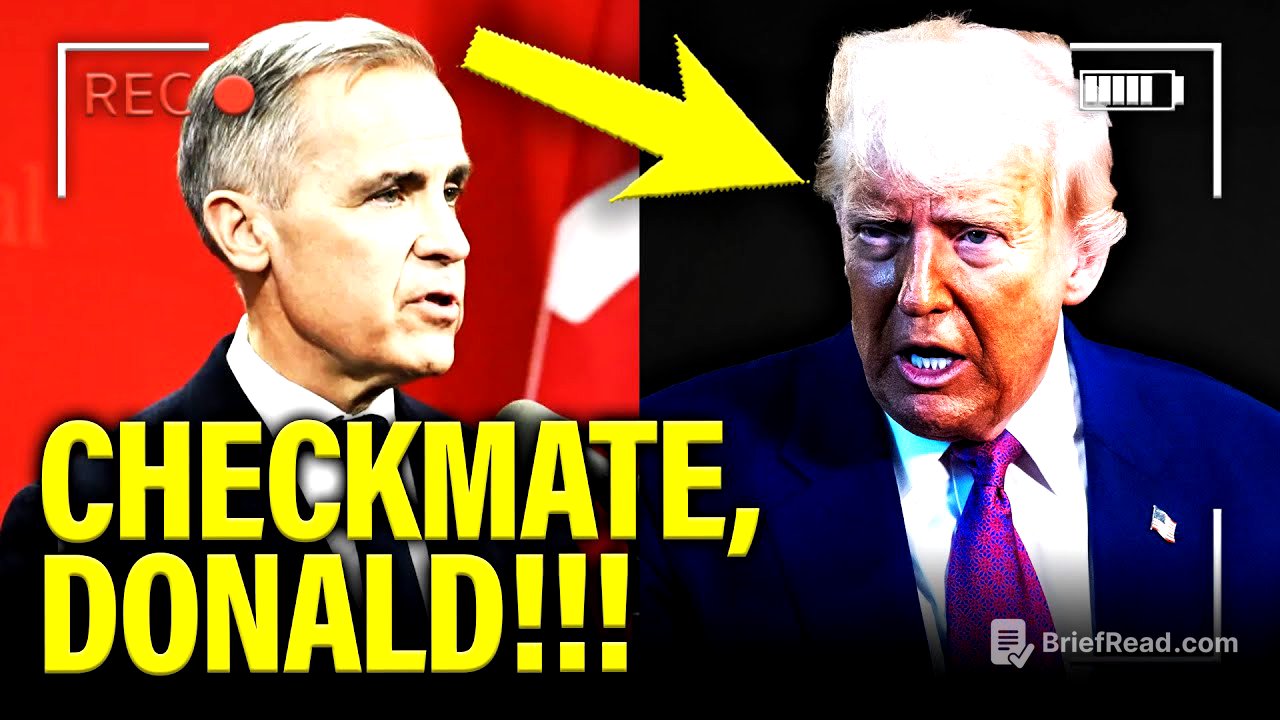TLDR;
This video discusses the escalating trade tensions between Canada and the United States under Donald Trump's administration. It highlights Canada's retaliatory tariffs, the reactions from U.S. officials, and the broader implications for the relationship between the two countries. The video also touches on the potential for Canada to diversify its trade relationships and the internal political dynamics within Canada regarding the trade dispute.
- Canada retaliated against U.S. tariffs, leading to increased trade tensions.
- U.S. officials have expressed displeasure with Canada's actions, using various justifications for the tariffs.
- Canadian officials are focused on protecting Canadian interests and seeking reliable trading partners.
- There is a sense within Canada that the U.S. is an unreliable partner under the current administration.
- Canada is exploring diversifying its trade relationships and increasing its own manufacturing capabilities.
Canada's Retaliation and U.S. Response [0:00]
The trade minister of Canada, Dominique Leblanc, addressed the issue of retaliatory tariffs imposed by Canada in response to a trade war declared by the United States. Leblanc emphasized that Canada's priority is to protect its own interests and that it is disappointed with the behavior of Donald Trump's administration. He noted that while Canada is the largest customer of the United States, it is also looking towards reliable trading partners.
U.S. Trade Representative's Perspective [1:02]
Jameson Greer, the United States Trade Representative, explained the rationale behind the 35% tariffs imposed on Canada for non-USMCA compliance. He stated that these tariffs were a response to Canada's retaliation against the U.S. when the trade war was declared. Greer suggested that if Canada removes the retaliatory tariffs, there might be room for negotiation.
Accusations and Justifications for Tariffs [3:50]
The Trump regime is using various excuses to attack Canada, including retaliatory tariffs, recognition of the Palestinian state and fentanyl concerns. Howard Lutnik criticized Canada for recognizing the Palestinian state, claiming it undermined efforts to achieve peace in Gaza. These justifications are seen as excuses to turn Canada into the 51st state and strip Canadian sovereignty.
Canada's Defense and Diplomatic Efforts [5:56]
Dominic Leblanc responded to American media inquiries about removing retaliatory tariffs, emphasizing Canada's commitment to defending its interests. He highlighted Prime Minister Carney's efforts to build a respectful relationship with President Trump. Leblanc pointed out the strategic importance of the steel sector to Canada's national security and the challenges posed by U.S. tariffs. He also mentioned Canada's strict rules against Chinese steel dumping. Despite the challenges, Leblanc expressed optimism about finding common ground and continuing constructive conversations with U.S. officials.
U.S. Ambassador's Critical View of Canada [10:55]
The U.S. ambassador to Canada criticized Canada for imposing a new tax and for provinces banning American products. He also addressed the issue of Donald Trump's suggestion that Canada should become the 51st state, interpreting it as a term of endearment.
Americans United for Separation of Church and State [13:29]
The video includes a message from Americans United for Separation of Church and State, emphasizing the importance of maintaining the separation between church and state to protect fundamental freedoms. They advocate for the right to believe and live as one chooses, as long as it does not harm others.
Canada's Strengths and Strategies [15:21]
Prime Minister Carney recognizes Canada's strengths, including strong public support, significant holdings in U.S. treasuries, and its position as the biggest customer of the United States. The tourism boycott and boycott of American products are impacting the U.S. He is also attuned to the legal challenges against Trump's trade war declarations. Carney is consulting with conservative leaders and former prime ministers to form a united front.
Ontario Premier's Perspective [17:50]
Doug Ford, the premier of Ontario, expressed frustration with President Trump's unpredictable behavior. He emphasized the need for Canada to onshore manufacturing and reduce reliance on the United States. Ford highlighted the importance of buying Canadian products and called out companies like Campbell Soup for misleading labeling practices.
Former Prime Minister's Changed Stance [22:56]
Former Prime Minister Stephen Harper, once a strong advocate for close ties with the U.S., admitted he was wrong and advised against making bad deals with the Trump administration. He emphasized the need for Canada to diversify its trade and export markets and to increase its defense spending to ensure independent responsibility for its own security.
Uncertainty and Instability in U.S. Trade Policy [26:41]
Kevin Hasset discussed the uncertainty surrounding tariff rates, stating that while some deals are more or less locked in, the final decision rests with President Trump. He acknowledged the possibility of market reactions prompting changes in tariff rates.



![AP Human Geography Unit 2 Live Review! [Population and Migration Patterns and Processes]](https://wm-img.halpindev.com/p-briefread_c-10_b-10/urlb/aHR0cDovL2ltZy55b3V0dWJlLmNvbS92aS9OLXhaUkQyRWRUMC9ocWRlZmF1bHQuanBn.jpg)





